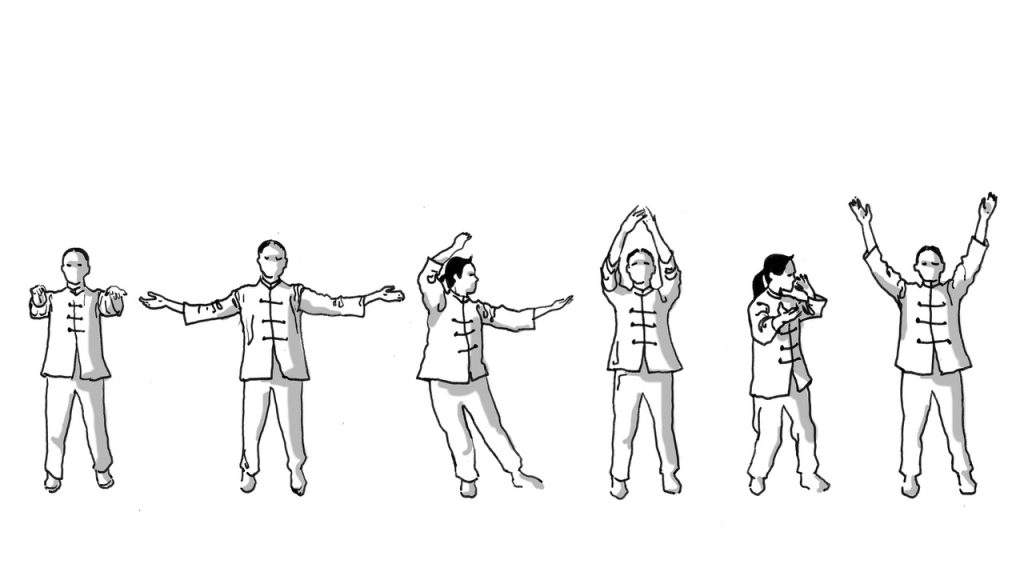For centuries, the practices of tai chi and qi gong have been developed to train our bodies in the same aspects of yielding, softness, and balance that we train our minds to follow.
These practices are often referred to as the physical implementation of the philosophies of the Tao Te Ching, and can lead to numerous health benefits, as well as underscore the philosophy that we want our minds to follow.
If you’ve seen tai chi practitioners’ ever-flowing, steady movements in action, imagine their thought process when faced with adversity as the mental side of this yin and yang.
Stiff and unbending is the principle of death. Gentle and yielding is the principle of life.
— Lao Tzu, Tao Te Ching
Tai chi can seem like a strange and complex set of movements to pick up, but at its core it’s a set of exercises that helps improve flexibility and activates muscles from the core to all other areas of the body.
Shibashi is a set of 18 basic tai chi movements that are easy to remember and quick for beginners to pick up. Start with the six shibashi movements described below; once you have those down, move on to the remaining 12.
- Commence the form. Stand naturally, legs shoulder width apart, knees slightly bent: this is the starting position for each step. As you inhale, slowly raise your arms in front of you, hands relaxed, fingers hanging down. Exhale and bring your hands back down, leading with your wrist, fingertips trailing behind as if gliding through the air.
- Broaden the chest. From the same stance with your arms outstretched in front of you, slowly bring them to your sides, forming a “T” with your body. Inhale as you broaden your chest, then exhale as you bring them back in front of you and down to your sides.
- Dance with rainbows. Inhale and slowly shift your weight to your right side, bending your right knee and straightening your left leg. Stretch your right arm above your head, your left arm at your side. Exhale and shift your weight to the other side of your body as you reverse arms positions. Imagine tracing a giant rainbow above your head.
- Circle the arms. From the starting position, put your hands together at the waist, palms out and crossed at the wrist. Inhale and slowly bring your arms up so your palms are facing in front of you. Turn your palms outward and raise them above your head. Exhale as you bring your arms back down in a circular motion from your sides back to the starting position.
- Twist the waist, swing the arms. Extend your left arm in front of you, palm facing upward at chest height. Inhale and bring your right arm up, hand next to your body ‘scooping’ air up, elbow bending outward, and twist your body to the right side as far as comfortable. Afterwards, switch sides.
- Row the boat. With your arms at your sides, palms outward and thumb pointed back, move your arms in large circular movements as if you were rowing a boat. Inhale as you circle up, and exhale as you circle down.
Repeat these movements slowly and carefully, in sets of six repetitions each. After you have them down, add the next six movements shibashi movements, and then finally the last six movements. Shibashi translates to ‘eighteen’ in Mandarin.
By practicing the shibashi movements, we are training our body in the same principles of flexibility, balance and softness that we train our minds. Practicing these physical movements along with the other techniques previously described helps build a healthy whole that combines the yin and yang of body and mind, and allows each side to strengthen the other.
[text-block-start]
At MaArtial, we believe in the yin and the yang of the body and mind, and that flexibility in the body can help to reinforce flexibility of the mind. Think of a bamboo reed as a metaphor for flexibility, and how it moves the wind but does not bend.
Shibashi tai chi exercises are a specific set of movements that are designed to activate and tone specific muscles throughout the body that may otherwise go unused during the day. Practicing them on a daily basis can be a great way to maintain flexibility.
[text-block-end title=”MaArtial comment”]
NEW! Put the principles from this article into practice with the free courage-boosting MaArtial app on the App Store for iOs and Play Store for Android.












